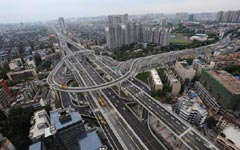BEIJING - China's industries are shifting from the advanced east to landlocked west and central regions, with the government vowing to build on this to boost the economy.
The industrial shifts will help improve urbanization in central and western regions and enrich less developed areas, allow for employment and growth, and upgrade the Chinese economy, said Premier Li Keqiang at a State Council executive meeting he presided over on Wednesday.
During his visits to Africa and Europe in May and June, Li found that employment was high on the agenda for many countries. Jobless rates have been high in Europe, the United States and developing countries.
|
 |
 |
In the past 30-plus years, farmers have been flowing from the west to coastal areas for factory jobs. But those areas are now less competitive due to rising labor costs after years of growth.
A way-out is to transfer some industries to western and central regions, Li said. But enterprises should by no means be forced into doing so. Companies should be attracted by low costs and a good business environment, the premier said.
Li cited an example he saw during his visit in Wanzhou district in Southwest China's Chongqing in April.
A manager of an e-commerce company told him that the business was first headquartered in Beijing, with an employee's salary at about 8,000 yuan ($1,311) per month. After the company moved to Wanzhou, an employee's wage went down to less than 3,000 yuan per month.
Despite this, the manager complained about Wanzhou's insufficient infrastructures.
Li stressed infrastructure construction in western and central regions, saying that it would help improve the business environment and create opportunities. Li also highlighted environmental protection during industrial shifts.
Niu Li, an economist at the State Information Center, a government think tank, told Xinhua that the government should adopt policies to avoid over-capacity or damage to the environment during regional industrial shifts.
China's gross domestic product (GDP) rose 7.4 percent year on year to 12.82 trillion yuan in the first quarter. Second quarter data is due on July 16.
The government has set this year's economic growth target at about 7.5 percent. Premier Li has said that as long as there is sufficient employment and there are no major fluctuations, actual GDP growth will be considered to be within the proper range, even if slightly higher or lower than the target.
